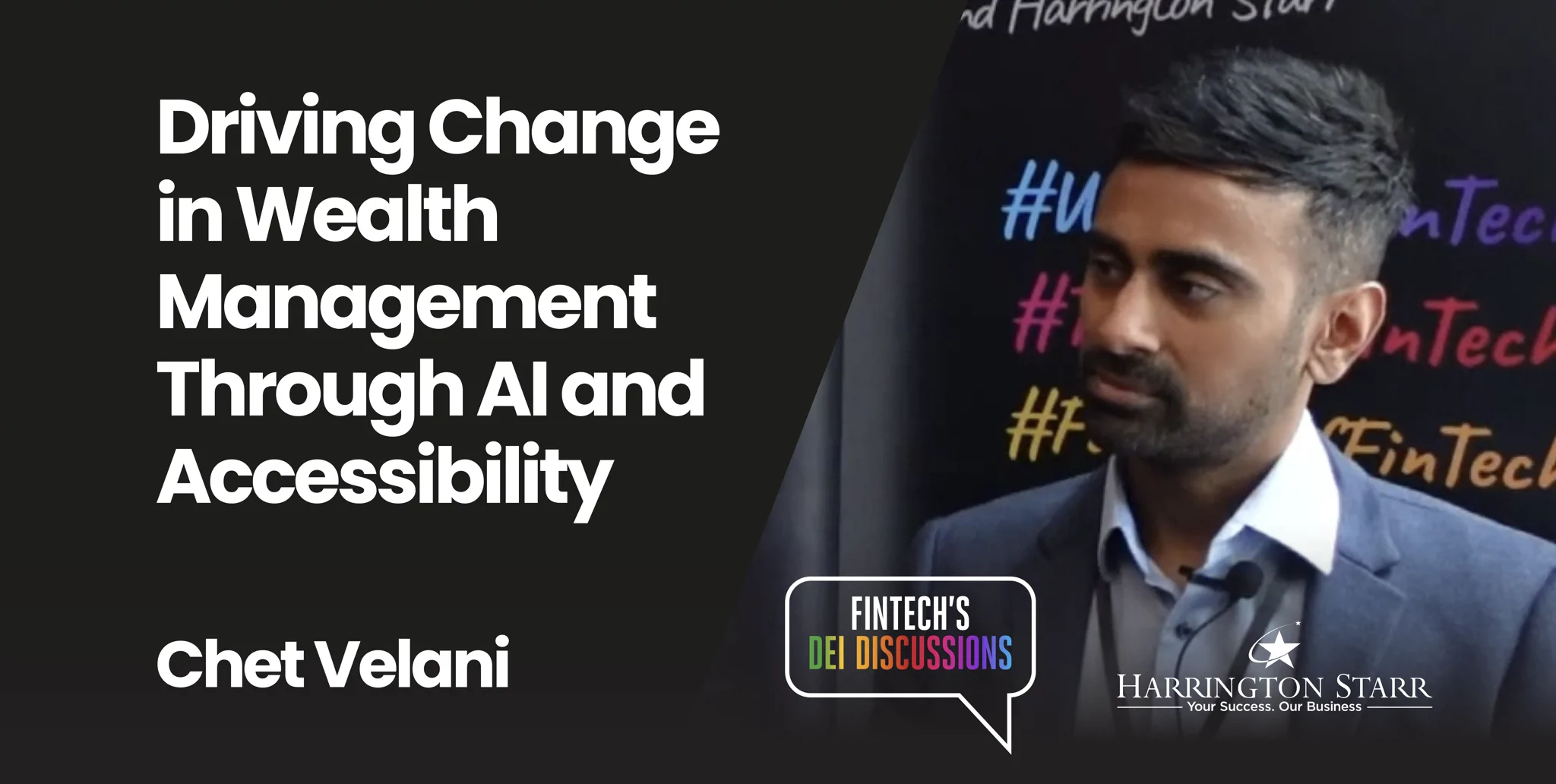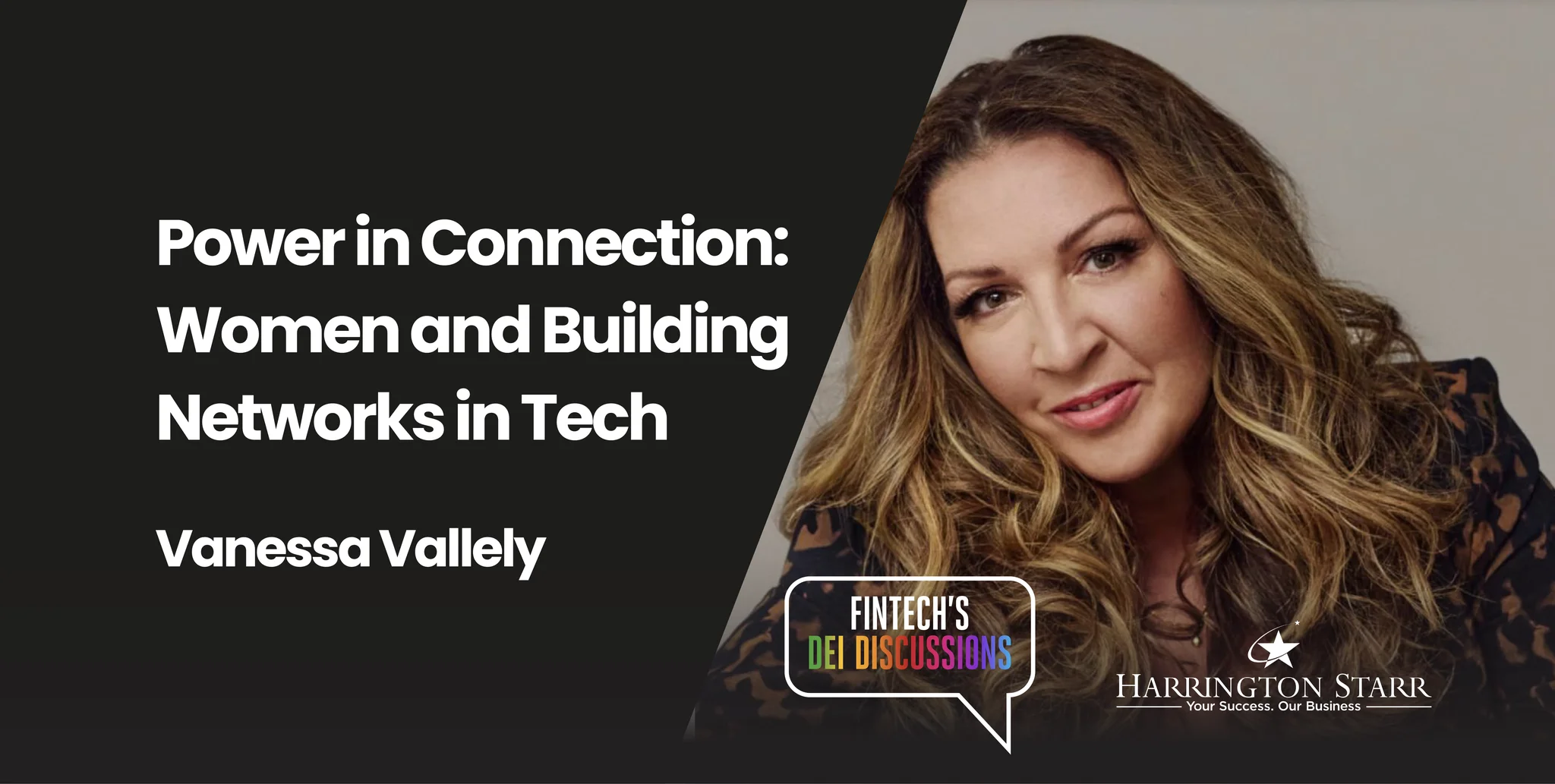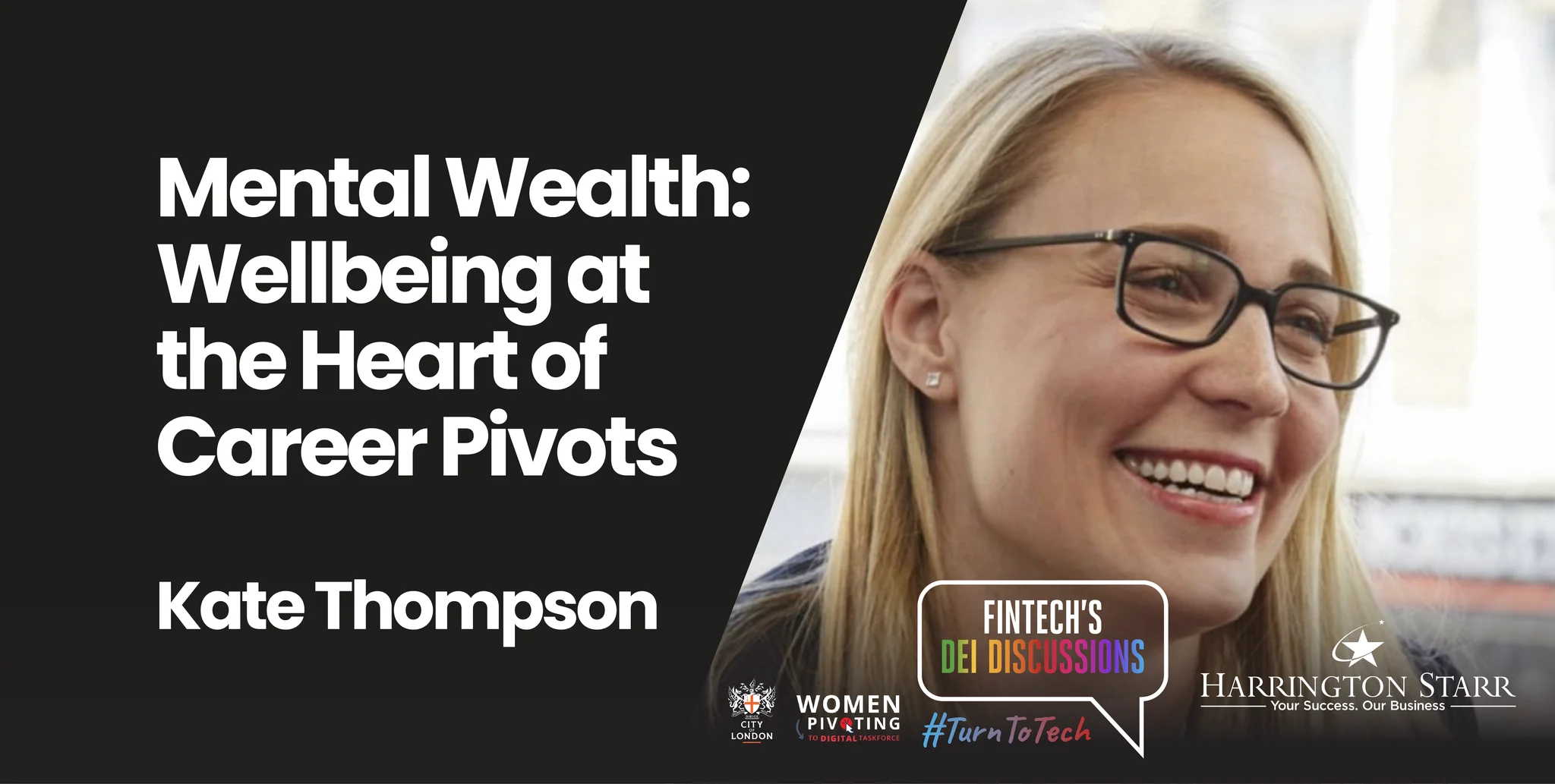
How Inclusive Technology Is Reshaping Wealth Management in FinTech
Recorded live at The Summit for Wealth Management 2025, this episode of FinTech’s DEI Discussions, hosted by Nadia Edwards-Dashti, features a compelling and highly relevant conversation with Chet Velani, Managing Director and Board Member at EV Financial Solutions. As the FinTech space continues to evolve rapidly, this episode dives into the vital intersection between inclusion, innovation, and leadership in wealth management. With a focus on using AI and hybrid models to drive scalable and accessible financial advice, Chet shares both his professional journey and his strategic outlook for the future of financial services.
At Harrington Starr, a specialist FinTech recruitment business, we are proud to share the insights of leaders like Chet who are shaping inclusive, forward-thinking financial services. The episode provides a rich exploration of how digital transformation and diversity are transforming wealth management, highlighting new demands for talent and a more inclusive future for the industry.
A Career in FinTech Built on Continuous Learning and Adaptability
Chet Velani’s professional story is one of evolution, perseverance, and agility, three traits that are essential in today’s FinTech landscape. His journey began in 2008 when he joined EV Financial Solutions as a graduate. At the time, the business was part of a much larger consultancy with thousands of employees. Since then, following a management buyout, EV has evolved into a dynamic company of around 80 people, focused on enabling better financial decisions for individuals through technology-driven tools.
Chet's early years at the company were marked by intense dedication, working full-time while studying to become an actuary. He committed long hours, sacrificing personal time to gain the qualifications necessary for a stable and prosperous career. However, once qualified, Chet realised that the technical nature of actuarial work, despite its intellectual value, didn’t fully align with his desire to interact with clients and shape business outcomes. This self-awareness led him to pivot into more externally-facing roles, gradually expanding into areas such as sales, marketing, and product before taking on a broader leadership position.
His ascent to Managing Director is a testament to both his technical grounding and his willingness to embrace new challenges. This story of cross-functional growth and leadership encapsulates a message that’s increasingly resonant across FinTech: adaptability is not only an asset but a necessity. For those seeking FinTech jobs or looking to progress their careers in the sector, Chet’s journey underscores the importance of being open to change, developing diverse skill sets, and never ceasing to learn.
Driving Inclusive Financial Advice Through Digital Innovation and AI
EV Financial Solutions has a clear and powerful mission: to help individuals make better financial decisions. This mission is enacted through a dual approach, offering guidance and delivering advice, focused particularly on investment and retirement planning. The company serves a broad range of UK-based financial institutions, from banks and building societies to wealth managers, financial advisers, and employee benefit consultants.
The distinction between guidance and advice is key. Guidance refers to tools and educational resources that help individuals understand potential financial outcomes and make informed decisions, while advice pertains to personalised, regulated support. Chet notes that only about 8–10% of the UK population currently has access to professional financial advice, primarily due to the high cost and manual nature of delivering it.
EV aims to make advice more inclusive by deploying technology, especially artificial intelligence, to digitise and scale solutions. Through automation of processes such as fact-finding, plan creation, and report generation, EV is creating a model that reduces reliance on human advisors while maintaining high-quality outputs. This digital transformation enables EV to reach a broader market, including individuals who would otherwise be excluded due to the traditional cost structure of advisory services.
For FinTech recruitment professionals and hiring managers, this points to a growing demand for skills in automation, AI, and client-centric product development. As more businesses shift towards scalable advisory models, the need for talent who can build and manage these technologies will only increase.
The Emergence of Hybrid Advice in Wealth Management
A major theme in this episode is the rise of hybrid advice models, where digital tools are combined with human insight to deliver financial advice at scale. During his panel at The Summit for Wealth Management 2025, Chet discussed the ways in which these models are changing the industry. Traditional financial advice, while effective for wealthier clients, is often out of reach for the majority of people due to time, cost, and complexity.
Hybrid models offer a way to bridge this gap. By automating time-consuming processes like data collection and initial analysis, advisors can focus on higher-value interactions. Alternatively, in cases where human involvement is unnecessary or unaffordable, AI-powered systems can provide entirely digital recommendations. This unlocks a previously inaccessible customer base, including individuals with savings in the range of £20,000 to £40,000 who historically could not access affordable advice.
Chet explains that this change is driven both by market forces and regulatory shifts. Financial regulators are increasingly focused on broadening access to advice, and hybrid models present a viable way to meet that demand. The implications for FinTech hiring are profound: companies must now build teams that blend regulatory knowledge with technical expertise, customer experience design, and scalable infrastructure development.
At Harrington Starr, we’re seeing heightened demand for professionals who can drive these hybrid models forward—from AI engineers and UX designers to compliance specialists and financial product managers.
Expanding Inclusion Beyond the Workforce: Financial Access for All
Chet makes an important distinction in this conversation: inclusion in FinTech must go beyond hiring diverse teams. It should also involve creating inclusive products and services that serve the needs of underrepresented and underserved communities.
Too often, financial advice has been geared towards individuals with substantial wealth. However, with advances in technology, it’s now possible to support people across a much broader income spectrum. EV’s AI-driven tools, including chatbots and avatars, provide accessible interfaces through which users can learn, plan, and optimise their financial futures.
By lowering the cost and complexity of financial advice, technology becomes a catalyst for genuine social impact. This kind of inclusion, where financial literacy and planning tools are available to all, is where FinTech can truly lead. Chet’s insights reinforce the idea that the future of financial services must be both digital and democratic.
This also reflects an emerging hiring priority within FinTech: finding candidates who not only have technical skills but are passionate about making a difference. As a FinTech recruitment partner, Harrington Starr is proud to support firms who place inclusivity and customer impact at the heart of their missions.
Cultural Inclusion in Financial Services: Rethinking Who Belongs
When asked what inclusion means to him personally, Chet speaks candidly about his experiences as a British Indian professional in a traditionally homogenous industry. Early in his career, financial services felt intimidating, a world dominated by stereotypical profiles of older, white men. Yet his experiences over time have been largely positive, particularly within EV Financial Solutions and the broader FinTech space.
Chet emphasises that true inclusion is about recognising and nurturing what individuals can bring to a business, irrespective of background, appearance, or education. His own career is a clear example: from a technical graduate to a multi-functional leader, his success has been defined not by fitting a mould, but by demonstrating capability, ambition, and adaptability.
He encourages businesses to think differently when hiring—to value diverse perspectives and to create environments where everyone feels empowered to contribute. This philosophy aligns closely with Harrington Starr’s own values as a FinTech recruitment company. We advocate for inclusive hiring practices that widen the talent pool, fuel innovation, and reflect the diversity of the customers our clients serve.
The Future of Advice: Regulatory Support and Scalable AI Solutions
Looking ahead, Chet identifies several key trends that will shape the wealth management sector. One of the most pressing is the regulatory focus on expanding access to advice. Initiatives such as the Advice Guidance Boundary Review and targeted support mechanisms are pushing firms to provide solutions for customers who currently lack support.
Technology is the enabler of this shift. AI is already being used to help financial advisers generate documents, automate back-office processes, and personalise communications. But the next frontier lies in broader, mass-scale applications of AI for customer engagement. EV Financial Solutions is leading the way with tools like virtual avatars that can guide users through financial decisions, suggest improvements, and simulate outcomes.
Chet believes that hyper-personalisation will become a cornerstone of financial advice. Much like a traditional adviser builds deep relationships with clients, AI systems will soon be able to do the same, at scale. They will provide customised journeys based on each individual’s needs, financial situation, and long-term goals.
For the FinTech jobs market, this signifies an increasing demand for professionals skilled in AI, machine learning, behavioural science, and customer experience strategy. As FinTech companies race to develop these capabilities, recruitment will play a central role in enabling innovation and staying ahead of regulatory expectations.
Advice for FinTech Leaders and Professionals: Be Open-Minded, Stay Curious
Chet ends the conversation with advice for professionals seeking to make a difference in FinTech. His message is clear: be open-minded. Whether it’s in hiring, partnerships, or career progression, openness creates opportunities for growth, learning, and innovation.
He shares that some of his biggest personal and professional leaps happened when he stepped into unfamiliar territory. He believes that by being relaxed about outcomes and focused on learning, professionals can navigate uncertainty with greater confidence. Mistakes, he says, are not failures but essential parts of the learning process.
This philosophy is especially pertinent in today’s FinTech environment, where agility, innovation, and human-centred leadership are more important than ever. At Harrington Starr, we see these values reflected in the most successful FinTech leaders and teams we work with—people who lead with purpose, build inclusive cultures, and embrace change as an opportunity rather than a threat.
A New Era of Inclusive Wealth Management in FinTech
This episode of FinTech’s DEI Discussions with Chet Velani is a timely and important contribution to the ongoing conversation around inclusion, digital innovation, and leadership in financial services. Through his insights, we gain a clearer understanding of how the wealth management sector is being reshaped by AI, hybrid advice models, and a growing focus on accessibility.
For FinTech recruitment firms like Harrington Starr, these conversations help highlight where the industry is heading—and the kinds of talent needed to get there. Whether you're building digital-first financial products, scaling advisory platforms, or creating inclusive team cultures, this episode is a powerful reminder that technology and inclusion are not mutually exclusive. In fact, they must go hand in hand.





